Growing as a Writer: My Trek Down Memory Lane
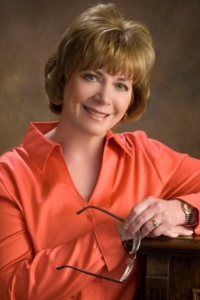
Author Donnell Ann Bell
By: Donnell Ann Bell
Years ago, when I left my newspaper job and turned to fiction, I was forced to become educated in a short amount of time. I also can assure you during that period, the self-assured nonfiction writer was humbled (Please note: I’m already pretty humble!).
WHAT I LEARNED:
There is a huge difference between fiction and nonfiction.
In journalism we’re taught not to editorialize, even when we are outraged, the topic turns personal, or we are particularly moved. While in fiction, we’re encouraged to do the opposite. Develop interesting characters, express their points of view, and show emotion on the page. Whether you’re writing science fiction, historical, fantasy, mystery, romance, the list goes on, in fiction, if your reader can’t relate to your character (or to put it bluntly—couldn’t care less), you’ve lost your reader.
To stress my point, as a new fiction writer, I once entered a contest in which New York Times Bestselling Author Suzanne Brockmann was my judge. She scribbled on my entry the following words, and trust me, she got her point across. “You write well BUT HOW DO THEY FEEL?”
There’s this thing called genre
Quite soon after I switched to fiction, I was told I should join a local writing group. To become a member, however, I would need to join the 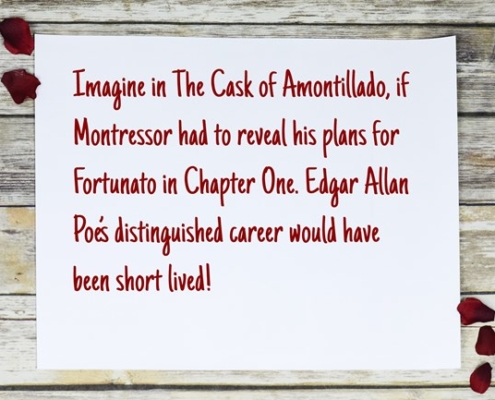 parent organization Romance Writers of America®. Both organizations during my tenure were stellar, and I credit both with my early fiction education. During my time with Pikes Peak Romance Writers, I attended something known as Open Critique (an avenue provided to writers not in a person’s regular critique group to provide fresh insight.) Here, I discovered another anomaly about fiction.
parent organization Romance Writers of America®. Both organizations during my tenure were stellar, and I credit both with my early fiction education. During my time with Pikes Peak Romance Writers, I attended something known as Open Critique (an avenue provided to writers not in a person’s regular critique group to provide fresh insight.) Here, I discovered another anomaly about fiction.
Fiction is broken into genres. To complicate matters, subgenres are often attached to the genre, oftentimes subs attached to the subgenres! On one Sunday afternoon, I submitted my perfectly written chapters, waited for the accolades, only to be met by the confused faces of my peers. “Why is this person skulking about? Who is he, and why should we care?” the OC leader demanded.
“I’m writing a mystery,” I stammered. “I can’t tell you that yet.”
That’s when I learned I was surrounded by romance writers who didn’t read my favorite genre. Further, they obviously couldn’t relate to what I was writing. One by one, in a chorus of agreement, members of the critique group asked me to explain upfront what my character was up to. Hardly conducive to my mystery plot. Imagine in The Cask of Amontillado, if Montressor had to reveal his plans for Fortunato in Chapter One. Edgar Allan Poe’s distinguished career would have been short lived, indeed!
Fortunately, I found a romantic suspense chapter in RWA® and remained in that group for many years.
But then I learned . . . .
Genres and subgenres evolve.
Much like society, authors change their mores and preferences. Romantic Suspense, which I enjoyed writing (and still do), began heating up the pages. Readers obviously adored the added sizzle, and publishers and their marketing departments noticed. Management conveyed those statistics to their editors. Editors spoke to the agents, and naturally my agent listened closely.
She asked me to spice up my unpublished novel, which back then was winning awards. The unpublished title was Walk Away Joe, and as an aspiring author who wanted to sell, I did my best. Unfortunately, I found I didn’t enjoy writing hot and steamy; I preferred suspense. Don’t get me wrong, if my book called for a sex scene, I was all in. I just didn’t enjoy writing copious amounts of it. Further I don’t do gratuitous anything—whether it be violence or sex.
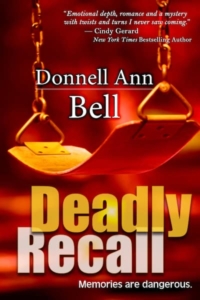 Around this time, my agent and I parted ways. By then, my second unpublished novel, DEADLY RECALL Deadly Recall | Romantic Suspense Thriller | Author Donnell Ann Bell, finaled in a major contest, and I queried BelleBooks, who is my publisher to this day. Pat Van Wie bought the book and would become my first editor. Still, in my editorial letter she told me to get rid of so much sex. We’re buying you because of your suspense. Not very flattering about the added sex scenes I’d worked hard to include. But truth be told, I was vastly relieved.
Around this time, my agent and I parted ways. By then, my second unpublished novel, DEADLY RECALL Deadly Recall | Romantic Suspense Thriller | Author Donnell Ann Bell, finaled in a major contest, and I queried BelleBooks, who is my publisher to this day. Pat Van Wie bought the book and would become my first editor. Still, in my editorial letter she told me to get rid of so much sex. We’re buying you because of your suspense. Not very flattering about the added sex scenes I’d worked hard to include. But truth be told, I was vastly relieved.
Walk Away Joe became THE PAST CAME HUNTING. It still includes a couple of sex scenes, and the chapters are loaded with romance and sexual tension. In my opinion, though, I left the critical scenes that belong in the book.
Years have passed since my debut book was published, but it remains one of my most popular books. And . . . as it turns out my publisher has put it on sale for .99, but the sale ends tomorrow, November 15! So, if you’re interested, grab yours quick!
These days I belong to Sisters in Crime, Mystery Writers of America, and International Thriller Writers. My editor is Debra Dixon, one very smart woman and the touted expert on Goal, Motivation, and Conflict. I write task force suspense and single title romantic suspense and my learning trek continues every day. https://www.donnellannbell.com
As I close out this blog, I’m curious about my fellow Stiletto Gang authors and others who may be weighing in. Was your journey anywhere close to mine? What early lesson(s) did you take away that led to what you write today? In other words, how have you grown as a writer?
Till next time!

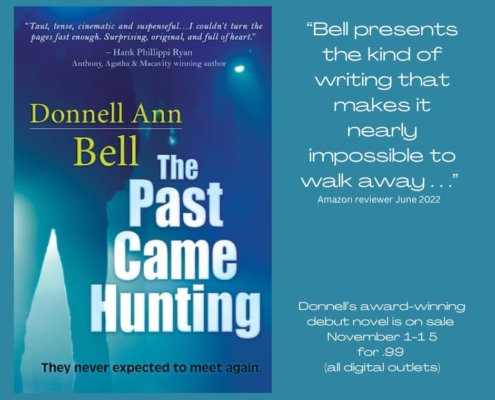
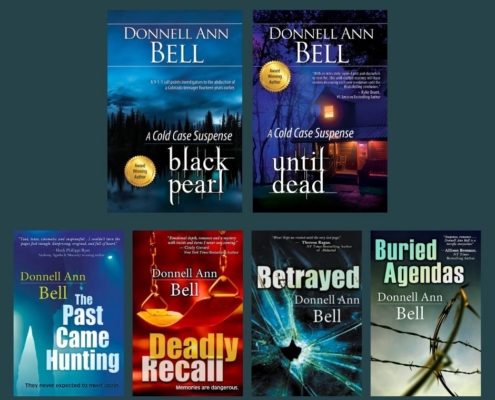
Donnell, looks like we’ve been on similar tracks. Glad you found your niche, too!
We did, Gay, thank you 🙂
I taught journalism and did a lot of technical writing before I started writing fiction. You’re right–there’s a big difference. But journalism is a wonderful teacher of tight, economical writing–a valuable lesson.
So true, Sarlyn. Every writer should learn to write tight. Another good way to lose your reader with overwriting, too long description or setting. A great way to learn tight writing is short story writing, which is another topic altogether. Short stories and novels are two separate beasts 😉 Thanks for sharing!
Donnell, as someone who has been beside you throughout most of your writing journey, I’ve been thrilled by each of your books and can’t wait to read the next one.
When I worked for a literary agency for 10+ years, I realized another difference between journalism and fiction writing. Journalists are taught to TELL their story (who, what, when, where, why), but a good fiction writer SHOWS her story. For that reason, not every journalist can put aside what has been so ingrained in them and successfully make th leap to fiction. You’ve done it beautifully!
Absolutely, Lois! I had the hardest time learning Show Don’t Tell. And showing to this day is difficult as authors must learn to keep their writing fresh and not repetitive. It’s been my pleasure and a great learning experience to share this journey with you 🙂
I began writing in my teen years, but some of my best lessons came from the years I spent as a freelance editor and ghostwriter. Reading other people’s work in order to find the core ideas and develop them taught me about structure and theme. Editing taught me about clarity and communicating no matter how complicated the ideas. The more I learned from nonfiction, the better my fiction became, though learning to write with feeling was always a challenge.
Susan, so many good points in your response. I think before anyone can walk, she has to crawl. So goes writing. You nailed it. Read, Read, Read. Editing shows us … oh , yeah, I do that in my novels. Need to clean that up. We often cannot see our own mistakes until we analyze objectively someone else’s work. Thank you for weighing in!
I loved reading how you transitioned from journalism to fiction!
If my background had been in journalism, it would probably have been easier to make the switch to writing fiction.
As a certified public accountant who worked in international finance, my only writing experience was preparing strategic plans to explain future financial goals. But my leap did not end going from boring finance and accounting to writing mysteries! Spanish, not English, is my native language, yet I write my novels in English.
I’m amazed that despite the different work backgrounds we each brought with us, the struggle has been very similar.
Oh my goodness, Kathryn, you must blog about the language barrier. I worked for a structural engineering company for ten years. I have a writing friend, Natalia Brothers, who penned a dark fantasy Soul of the Unborn. Natalia came from Russia, and I was so impressed with her writing. But my engineering colleagues scoffed at the idea that a Russian-born citizen could possibly adept in writing an English novel. I beg to differ. Think about the language barrier as a blog topic. I invite you to do so on either Stiletto Gang or my blog Help From My Friends Friday!
Thanks, I will. Quite honestly, I had not thought about blogging about the language barrier and nuances.
One of my assignments at the CSBJ was assigning business topics. 😉 Guess it carried over.
xo
donnell
Donnell,
Like so many fiction writers, change was difficult. For over forty years, I wrote police and investigative reports. Reports in which I TOLD when, why, where, who and how. Imagine the struggles learning SHOW. It’s still a struggle. Your books are a primer I turn to for help.
Thanks for all you do for your friends in the writing community.
George, I am beyond flattered by your comment. I was a volunteer for the El Paso County Sheriff’s office, and I read those reports. Even then, I thought they were stodgy and could have more emotion put into them. But!!! Imagine a report showing in a police report. The officer’s sergeant might suspect the job is getting to him 🙂 Thanks for stopping by and discussing this topic, George!
This is so interesting!! Thank you for sharing your journey. I was a big reader of cozy mysteries but never formally trained. I’ve learned so much from reading, writing, belonging to groups such as Sisters In Crime, International Thriller Writers, and Crime Writers of Canada. I also find some great tips from Podcasts such as The Sh*t No One Tells You About Writing, Cozy Corner, and Get Cozy.
Learning by example, Lynn, nothing better! And the organizations you mention are stellar for writes of our ilk 😉 Thanks for sharing!
Coming from a different writing background, it is interesting to see how we all have had to learn to show not tell. I think of other writers, besides the ones who have left comments here, who have learned to do it effectively – Ex. technical writers – Edith Maxwell and Grace Topping, Lawyers – Scott Turow, John Grisham, (okay, I’ll throw myself into this group but won’t claim the success they have had – yet). The one thing we all seem to have in common is a story idea and the willingness to learn how to communicate it effectively (even if it takes reading other writers’ works, editing, classes, and standing on our heads).
Debra, I have yet to stand on my head. I have rolled across the floor to a flight of stairs, to see if my protagonist could escape a bad guy. Still, I don’t think this old body will do headstands anymore. 😉 Yes, throw yourself into the mix. I often tell lawyers who are considering writing fiction, “Lawyers make excellent writers.” Lisa Scottoline, anyone? Lawyers deal with words. They watch what tools work best to influence a judge (you my dear) and jury. It’s only natural they zero in on “Show Don’t Tell.” Thank you for weighing in!
I was a journalism major and spent most of my career in PR and advertising. Okay, that means I’d done some fiction writing. But not the kind of fiction writing that goes in books. In-person and online fiction craft classes helped me make the transition to novel writing. Critique partners who write in the same genres are another blessing. One carry-over from my nonfiction days is how much fun it is to research new topics and interview experts on topics I plan to incorporate in my books.
Oh yes, Linda! Welcome by the way! You nailed it. In our past lives research was crucial to getting the job done. By seguing into fiction, we get to live the best of both worlds. The one thing you have that I don’t have, which I envy, is your PR, Marketing background. Ideas bounce off you as a matter of course! And your past careers have led to awards. Thank you for weighing in. It’s been a long time. Would love to catch up!
Great post, Donnell. So much of what we’ve experienced earlier goes into our writing—both in plot and our development as writers.
Marilyn, the beauty of what we do in fiction is we are ALWAYS learning. It’s all material! Thank you for weighing in.
Good commentary on the evolution of you as a writer of nonfiction to fiction, Donnell. I share many similar experiences as the ones you mention, especially learning to inject feelings and showing into my writing. Like my buddy, Big George Cramer, I wrote police reports for years and had to just tell the facts. I got a laugh about you saying that you once rolled across a floor to see if your protagonist could escape. I once had a scene where my detective hero was handcuffed behind his back and managed to get the cuffs in front of him. I’d done this with ease during my youth, and decided to try it again in the solitary confines of my house. What I didn’t realize was that my posterior had expanded a bit in the intervening years. I then realized that I couldn’t reach the key, which had become buried in my front pants pocket. My first thought was if I have to dial 9-1-1, how am I going to explain the situation to the responding officers? This gave me the incentive to struggle through the process but it took a lot longer than it once had. I enjoyed your blog and look forward to your new book,
Oh my gosh, Mike. The handcuff scenario would have made it into a legendary conversation around the precinct for decades to come…. did ya here the one about …. 🙂 Thank you for stopping by and talking about police reports. They were among the dryest of the dry 🙂
Donnell, What a great post. My first four books are how-to quilting books. I’ve had to learn so much while learning to write fiction! Thanks for sharing your journey. I feel encouraged!
Barb, with every book, we learn so much, would you agree! Thank you and congratulations!